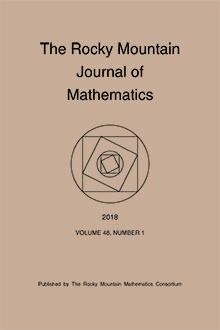Abstract
Let $\mathcal {C}_s$ be the set of Dyck paths of length $2s$. For all $s$ its cardinality is given by the Catalan number $C_s$, i.e., $\#\mathcal {C}_s = C_s$. We denote the maximum of a Dyck path $X$ by $X_{\max }$, and thereby we define the exponential moments $E_s(\lambda ):= C^{-1}_s\sum _{X\in \mathcal {C}_s}\exp (\lambda (2s)^{-1/2}X_{\max })$, whereupon we scale the Dyck paths' maxima by the root of the path length. Then, there exists a function $d: \mathbb {R}\to \mathbb {R}$ so that $E_s(\lambda ) \le d(\lambda )$ for all $s\in \mathbb {N}$. We present an elementary proof of this well-known result, which is based on the reflection principle and a telescoping sum trick; in particular, nothing about stochastic processes is used.
Citation
Felix Grimme. "All exponential moments of the Dyck paths' maxima (scaled by root of path length) are uniformly bounded: An elementary proof." Rocky Mountain J. Math. 45 (6) 1861 - 1872, 2015. https://doi.org/10.1216/RMJ-2015-45-6-1861
Information





